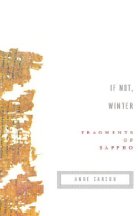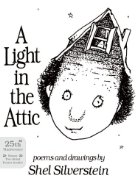Have y'all actually READ this thing? I mean the entire sonnet, beyond the famous first line:
How do I love thee? Let me count the ways.
I love thee to the depth and breadth and height
My soul can reach, when feeling out of sight
For the ends of Being and ideal Grace.
I love thee to the level of everyday's
Most quiet need, by sun and candlelight.
I love thee freely, as men strive for Right;
I love thee purely, as they turn from Praise.
I love thee with the passion put to use
In my old griefs, and with my childhood's faith.
I love thee with a love I seemed to lose
With my lost saints - I love thee with the breath,
Smiles, tears, of all my life! - and, if God choose,
I shall but love thee better after death.
That is a breathtaking poem. It's a shame that its rich, powerful language has gotten lost under countless parodies of its first line (the first one I remember seeing was delivered by Sesame Street's Count von Count), but it's even harsher that the sonnet's author, Elizabeth Barrett Browning, has been relegated to the status of "minor" or "out-of-fashion" poet by the academic community, who should know better. I can only think of one other line of poetry that is so well-worn, and everybody knows who wrote the "to be or not to be" speech. In contrast, I had no idea where Barrett Browning's "How do I love thee?" line came from until my senior year of college. As an ENGLISH MAJOR.
My sense of Academia's rationale is that because the work of Barrett Browning's husband Robert Browning is more diffficult, and presages the Modernist movement that followed him, and for reasons, of course, totally unrelated to the fact that he was MALE, we should be studying him instead. That, and it is unfashionable to be quite as earnest or do-gooder as the Victorians got at the height of their trajectory. We in this postmodern world just can't palate it. Even I feel a hint of trepidation when I contemplate the idea of a novel-length poem devoted to the travails of a young female poet struggling to gain respect for her artistic endeavors in a cruel world of unfeeling marriage proposals and forced domesticity.
But look at this gorgeously crafted sonnet. It takes a sentiment that is completely inarticulable to most of us - that of feeling the love we hold inside us for another person expand until it seems to transcend all boundaries - and encapsulates it with careful, loving language. If, as bell hooks claims, "love" is a verb rather than a noun, and "loving" someone an ongoing, active pursuit, this poem is a testament to the care and hard work of the composer.
The juxtapositions of love in the poem are so rich: the beautiful juxtaposition between the exalted and the everyday, between loving someone to the extremity of spiritual being that you can even comprehend, and loving them "to the level of everyday's / Most quiet need." The level of everyday's most quiet need. What an amazing line.
I love that a feminist Victorian woman, who viewed many marriages as economic shackles placed on the ankles of aspiring female artists, could nonetheless find a relationship where she could honestly claim to love a man "freely, as men strive for Right." The idea that crafting a good, strong relationship between two people is one aspect of making the world a better place, a caring and generous part of the reforming (Victorian word) or activist (21st-century word) spirit made flesh.
The contrast between experience and innocence is also astounding, between loving someone "with the passion put to use / In my old griefs" and loving them "with my childhood's faith." I connect deeply with the idea that people are deepened by experience, and that they can choose to push that depth out toward the world, enriching and improving it. The notion that a painful experience can change one's character in a way that, without excusing or altering the initial suffering, can prepare them for rich goodness later on, resonates with me indescribably. Yet it is even more beautiful to hold within you both the "passion put to use / in...old griefs" and the unquestioning, secure faith of childhood, to love from the depths of experience and also the depths of innocence at one and the same time.
And I love the gasp of frustration or overwhelmption implied by the dashes toward the end, and the line they encapsulate: "- I love thee with the breath, / Smiles, tears of all my life! -" It's as if, after keeping the enormity of her love within the bounds of the articulable for eleven and a half lines, she suddenly throws up her hands and almost, but not quite, lets it overwhelm her. It's inspiring when a poem can express so well that the thing it is trying to express is inexpressible.




